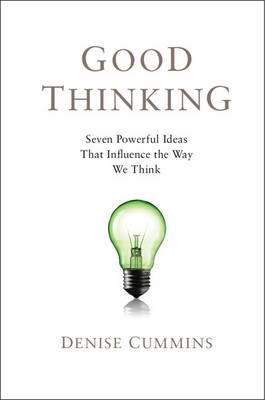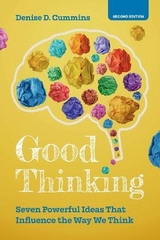
Good Thinking
Cambridge University Press (Verlag)
978-0-521-14550-3 (ISBN)
- Titel erscheint in neuer Auflage
- Artikel merken
Do you know what economists mean when they refer to you as a 'rational agent'? Or why a psychologist might label your idea a 'creative insight'? Or how a philosopher could be logical but also passionate in persuading you to obey 'moral imperatives'? Or why scientists disagree about the outcomes of experiments comparing drug treatments and disease risk factors? After reading this book, you will know how the best and brightest thinkers judge the ways we decide, argue, solve problems and tell right from wrong. But you will also understand why, when we don't meet these standards, it is not always a bad thing. The answers are rooted in the way the human brain has been wired over evolutionary time to make us kinder and more generous than economists think we ought to be, and more resistant to change and persuasion than scientists and scholars think we ought to be.
Denise D. Cummins is Adjunct Professor of Psychology and Philosophy at the University of Illinois, Urbana-Champaign. She joined the faculty in 2005. She has taught and conducted research at Yale University, the University of California, the University of Arizona and the Max Planck Institute for Adaptive Behavior in Berlin. She is the co-editor of Minds, Brains, and Computers: The Foundations of Cognitive Science and The Evolution of Mind and author of The Other Side of Psychology: How Experimental Psychologists Find Out About the Way We Think and Act. Her publications also include dozens of articles in scholarly journals such as the Journal of Experimental Psychology, Cognition and Synthese. She has been an invited speaker at such prestigious institutions as the University of St Andrews (Scotland), Durham University, Emory University and Dartmouth College.
1. Introduction; 2. Rational choice: choosing what is most likely to give you what you want; 3. Game theory: when you're not the only one choosing; 4. Moral decision-making: how we tell right from wrong; 5. The game of logic; 6. What causes what?; 7. Hypothesis testing: truth and evidence; 8. Problem solving: another way of getting what you want; 9. Analogy: this is like that.
| Zusatzinfo | 12 Tables, unspecified; 1 Line drawings, unspecified |
|---|---|
| Verlagsort | Cambridge |
| Sprache | englisch |
| Maße | 156 x 234 mm |
| Gewicht | 370 g |
| Themenwelt | Sachbuch/Ratgeber ► Gesundheit / Leben / Psychologie ► Psychologie |
| Geisteswissenschaften ► Psychologie ► Allgemeine Psychologie | |
| Geisteswissenschaften ► Psychologie ► Verhaltenstherapie | |
| Sozialwissenschaften | |
| ISBN-10 | 0-521-14550-3 / 0521145503 |
| ISBN-13 | 978-0-521-14550-3 / 9780521145503 |
| Zustand | Neuware |
| Informationen gemäß Produktsicherheitsverordnung (GPSR) | |
| Haben Sie eine Frage zum Produkt? |
aus dem Bereich



